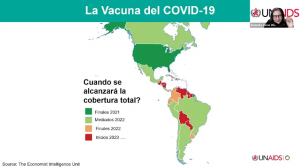By José Luis Maldonado Manzaneda.
The City of La Paz, seat of the Bolivian government, dressed up in colours and joy. It seemed that everything was set to celebrate the passing of the gender identity law: while in the city’s streets and avenues the major folklore music festival of the year was taking place, just blocks away the law was being enacted.
 Alongside the acting president, Álvaro García Linera, and the Justice Minister, Virginia Ayllón, dressed up in a morenada outfit, for one of the country’s typical dances, Tamara Núñez del Prado, activist and leader of trans women, raised in jubilation Law No. 807 for Gender Identity.
Alongside the acting president, Álvaro García Linera, and the Justice Minister, Virginia Ayllón, dressed up in a morenada outfit, for one of the country’s typical dances, Tamara Núñez del Prado, activist and leader of trans women, raised in jubilation Law No. 807 for Gender Identity.
Many years and many times of anguish were withstood to reach this achievement. It has been a painful journey full of discouragement and fear, but in the end the goal was reached, that of the right to gender identity.
This hard path began many years ago with lobbies and interventions. At first the project appeared to have been abandoned and shelved by the Justice Ministry, as various incumbents passed through the position. However, in November 2015, the ministry presented in the hall of the government palace the proposal for Law No. 807 for sexual identity and gender identity, as a proposal from the executive power to the legislature (called Plurinational Assembly in Bolivia).
 It was expected that the bill would be debated between December of last year and January of this year, during the legislative session. However, the initiative was cut short once again despite coming with the executive’s recommendations. There was evident transphobia and a lack of political will. There was also another issue on the public agenda that hogged the limelight, namely the referendum to decide on re-election. This opportunity was used by religious fundamentalists, who used blackmail and political scheming to stop the proposal. The city was filled with homophobic and transphobic propaganda, calling for an all-out rejection.
It was expected that the bill would be debated between December of last year and January of this year, during the legislative session. However, the initiative was cut short once again despite coming with the executive’s recommendations. There was evident transphobia and a lack of political will. There was also another issue on the public agenda that hogged the limelight, namely the referendum to decide on re-election. This opportunity was used by religious fundamentalists, who used blackmail and political scheming to stop the proposal. The city was filled with homophobic and transphobic propaganda, calling for an all-out rejection.
But as an omen of things to come, on 17 May candles were lit with the colours of the rainbow in memory of those victims of homophobia and transphobia. On Wednesday 18, the House of Deputies debated the bill for over five hours. To support the legislative initiative, videos were shown of testimonies prepared by trans sisters to raise awareness. These highlighted some of the worst cases of discrimination, from insults in Aimara – one of the native languages of the country – by Congressman Rafael Quispe, who also claimed that in the Andean cosmovision there only existed chacha and warmi (man and woman in Aimara) and that trans people did not exist. These were heated, tense moments of debate in which even some deputies, who we believed were our allies, stood against the initiative. A national consultation was even suggested to put a stop to the law. Despite this, at around 2:35 a.m. on Thursday 19 May, amid sobbing and hugging from the activists, the bill was passed and sent to the Senate for its ratification that same day.

The next hours were the most tense of the process, as a period of 24 hours is permitted to challenge any vote in the House of Deputies. The LGBT movement kept a very low profile so that the law’s detractors would not jeopardize the initiative. It is known that some organizations close to the LGBT population barracked themselves in, alert and ready to start protest actions if necessary. This was the case of Asociación Un Nuevo camino (ASUNCAMI, Association A New Way) and Asociación de desarrollo social y promoción cultural (ADESPROC, Association for Social Development and Cultural Promotion) and others in the LGBT collective.
It wasn’t necessary. The bill was passed by the Senate and passed on to the executive to be signed and enacted. Evo Morales was expected to return from his trip to Cuba, but to the joy and surprise of many it was Vice-president Álvaro García who enacted it as acting president. The waiting was over. The torment was over, one which for many sisters began when they were born, as was the case of Pamela Valenzuela, who for over 20 years has had to live with a name that does not identify her.
 Pamela Valenzuela commented to Corresponsales Clave that 30 days after this law is enacted, “the first requests can be made, with a normal letter that doesn’t have to be notarized, addressed to the Justice Ministry, indicating the name to be taken, for the change to be made at the Civil Registry Service (SERECI) and the General Service for Personal Identification (SEGIP)».
Pamela Valenzuela commented to Corresponsales Clave that 30 days after this law is enacted, “the first requests can be made, with a normal letter that doesn’t have to be notarized, addressed to the Justice Ministry, indicating the name to be taken, for the change to be made at the Civil Registry Service (SERECI) and the General Service for Personal Identification (SEGIP)».
Applicants must be over 18 and must submit the required documents: their current identity document, birth certificate, the letter addressed to the ministry and the police certificate of any criminal record (REJAP). 18. Except for the name and gender identity, all the details on the document, such as age and family name, will be maintained.
Valenzuela pointed out firmly that this Law does not end transphobia nor the efforts to put a stop to it. She also confirmed that the trans movement will continue to support the demands of the LGBTI population, just as those movements supported this Law, including the Family Life Agreement Bill and the criminalization of hate crimes.
We must now intensify the campaign to satisfy the other demands of the LGBTI population in Bolivia and we know that the fight will be tense as the fundamentalists are on alert and more attentive. Let us hope that the country will join those who have progressed in bringing back human rights to the LGBTI community. To the sound of music a day that will stay in the memory of all people was brought to a close.











Añadir comentario